Sukanya Verma in Mumbai
In this series, we re-visit great Hindi film classics. Today, we look back at Amol Palekar and Zarina Wahab starrer Gharonda (1977).
Sometime back I discovered a diary maintained by my father in the early 1970s.
Most of the pages revealed his heartrending efforts to buy a house in Bombay (it wasn’t Mumbai then), the kind of problems and anxiety he experienced till it was finally ready for him to leave a crammed PG arrangement and move in.
Even today, his struggle resonates with many others who similarly strive to make a home on their humble savings without any backing or inheritance at their disposal.
From outside, the City of Dreams appears glitzy and welcoming but it’s seldom easy.
Most of its service class inhabitants survive on hope, ambition and hard slog with a varying degree of priority towards each of these qualities. The ultimate goal, of course, for most of us is to belong and a home is its definitive realisation.
Adman, animator and filmmaker Bhimsain Khurana plays upon the idea and explores the consequences of taking short cuts to achieve this objective in his still relevant Gharonda starring Amol Palekar, Zarina Wahab and Dr Shreeram Lagoo.
Classic: Love, longing and disillusionment in Gharonda
Image: Zarina Wahab in GharondaDr Shankar Shesh’s story, with a discerning screenplay and dialogues (co-written by Bhushan Banmali) by Gulzar, doesn’t limit its concerns to the grey areas of human behaviour or the technicalities of owning property in a rapidly expanding metro.
Gharonda presents a straightforward view of life in Bombay for an average middle class office-goer -- the good, the bad, the ugly, the complete package.
If it acknowledges the sense of self-sufficiency the commercial capital offers, it also bluntly points out the disillusionment, indifference and loneliness it spawns.
Unlike Palekar’s Chhoti Si Baat or Baaton Baaton Mein, which too sets itself against the city’s brisk pace and everyday sights, the 1977 release isn’t steeped in feel-good humour but pragmatism, tons of it.
Before the film arrives to such solemn conclusions, Palekar and Wahab portray the gratifying side of realism with charming simplicity.
His Sudip is a clerk, her Chhaya is a typist, and they both sit on adjacent desks in a cosy working space of six employees including an office attendant.
The atmosphere is most believable with the faithful sound of typewriter filling the background and a staff that is alternately vain and dedicated.
Dr Shreeram Lagoo’s Mr Modi plays the middle-aged boss recuperating from a delicate heart condition.
Classic: Love, longing and disillusionment in Gharonda
Image: Amol Palekar and Zarina Wahab in GharondaDonning bell-bottoms, partially unbuttoned shirts and printed cotton saris paired with a omnipresent red sling purse respectively, Sudip and Chhaya bond over cool nariyal pani and spicy bhelpuri, roaming around the sparsely populated Chowpatty beach and brand new Marine Lines bridge, watching the towering skyline of Bombay perched on a throne of rocks, soaking in the breeze exclusive to front-seaters of the classic red double decker, oblivious to the deafening factory alarm set out by industrial units, a booming reminder of this city’s once throbbing mill culture.
High on romance, their starry-eyes seek to set up a nest, not in their currently stuffy chawl, but in an upcoming multi-storeyed building of ‘Andheri East’ next to the ‘Goldspot factory.’
They’re as Gulzar lovingly describes, ‘Do deewane shaher mein. Raat aur dopahar mein. Abudaana dhoondte hain ek aashiyana dhoondte hain.’ The poet and filmmaker won a Filmfare trophy for Best lyrics.
During one such endearing moment, the wishful duo browses through apartment brochures and fancies the possibility of a 10x10 bathroom and 4x3 living room, suggesting, ‘Rahenge bathroom mein, nahayenge drawing room mein.’
And when the grounded Chhaya bursts Sudip’s bubble by bringing up the mention of ‘bills,’ he good-humouredly scoffs, ‘Kya Premchand ka realism laayi ho.’
And indeed Premchand’s brand of realism is what ensues after the builder dupes them and absconds with all the money resulting in the suicide of Sudip’s roomie, who’s invested all his wealth to purchase the intended flat.
Classic: Love, longing and disillusionment in Gharonda
Image: Zarina Wahab and Sriram Lagoo in GharondaThis incident turns the otherwise optimistic into a picture of cynicism and he proposes a dark, depraved solution to Chhaya -- marry the rich, in all probability, dying boss and end their collective misery.
Chhaya agrees to wed her boss with whose deceased wife she bears an uncanny resemblance.
Only this isn’t some generic Bollywood potboiler and no dramatic violins are brought into play. Nor does the camera go overboard to capture any sinister expression on Palekar or traces of greed in Wahab.
Bhimsain’s characters are products of terrible hardships, pressing needs or deep-rooted loneliness.
Sudip’s suggestion, while most despicable, is born out of desperation, frustration and anger -- Is shaher ke log rone ke liye kandha nahi dete, marne ka intezar karte hain kandha dene ke liye.
And his subsequent regret and newfound integrity when Sriram Lagoo unsuccessfully attempts to provide financial aid only implies his earlier behaviour was nothing more than an ugly outburst that Chhaya lacked the wisdom to deal with.
Classic: Love, longing and disillusionment in Gharonda
Image: Zarina Wahab and Amol Palekar in GharondaOn the other hand, there’s no judging Chhaya.
She makes a conscious decision to squash her desires and marry into affluence in order to provide a better life for her further-studies aspiring kid brother. Chhaya’s elder brother made a sacrifice for her previously; it’s a cycle she’s conditioned for.
In Bollywood, romance bears a do or die sentiment but in Bhimsain’s lifelike view, people can/do move on.
Chhaya honours the commitment she’s made and makes a genuine effort to blend in her luxurious lifestyle without compromising on her core values. ‘Guldaste mein rakhi rahegi toh jad kaise pakedegi,’ says an onlooker from her neighbourhood.
It’s not the smoke-filled company of rummy-playing housewives she cares for preferring the undivided attention of her older half at their palatial home in the country or watching a staged adaptation of a chapter in Ramayana in its goofiest avatar (few years before Jaane Bhi Do Yaaron spoofed a important scene from Mahabharat).
Despite ‘he says Eiffel Tower in Paris, she says Borivali‘s National Park’ worldview, there’s palpable warmth between the odd couple. Her growing attachment works persuasively only because Lagoo, in a Best Supporting Actor Filmfare award-winning turn, comes across as not some well-off compromise but a charismatic, patient and pleasurable husband.
The triumph of his character lies in his composed, unflustered persona, glimmering eyes that appear to read everyone’s mind and Gharonda’s deftly written lines that convey a world in just two sentences.
It’s one of the veteran’s most polished performances and so more than the pained patriarch Hindi films limited him to.
Classic: Love, longing and disillusionment in Gharonda
Image: Zarina Wahab and Amol Palekar in GharondaIn a year, when audiences were regaled with out and out entertainers like Amar Akbar Anthony, Dharam Veer and Hum Kisise Kum Nahin, director Bhimsain (who’s also responsible for the classic animation short, Ek chidiya anek chidiya) stands out with a critically-acclaimed film that relates the woes and wants of folks residing in those matchbox sized abodes of Mumbai, Bombay, Bambai, you prefer?
Devoid of superficial attractions, Gharonda relies on Amol Palekar and Zarina Wahab’s accessible personality to make an easy connection.
While Gulzar and Naqsh Lyallpuri’s free-flowing verse, Jaidev’s timeless score, even though there are only three songs -- Do deewane shaher mein, Ek akela is shaher mein and Mujhe pyaar tumse nahi hai, in Runa Laila’s peppy rendition and Bhupinder Singh’s marinaded-in-mint voice lends Apurba Kishore Bir’s unadorned imagery a zest of its own.
Not much has changed in 35 years.
The problems in Gharonda still exist. So does some of its philosophy as articulated by a know-all type in one scene, ‘Yeh Bambai hai, pyaare! Yahan toh shamshan ka raakh bhi bikta hai. Khareedo mat becho.’

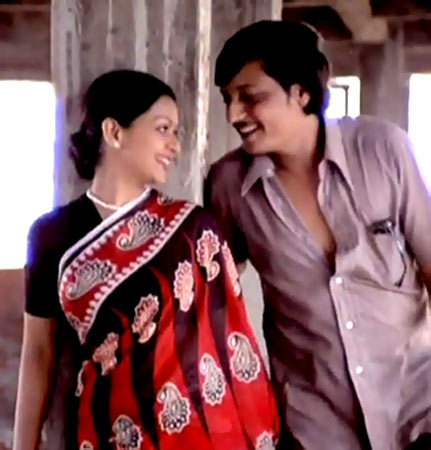
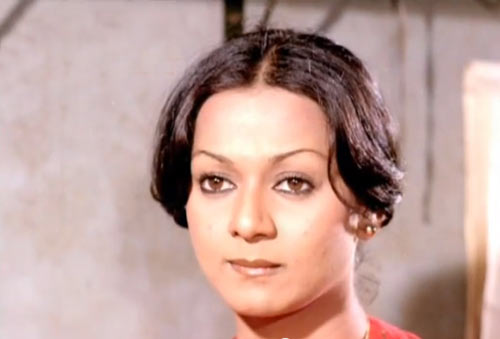

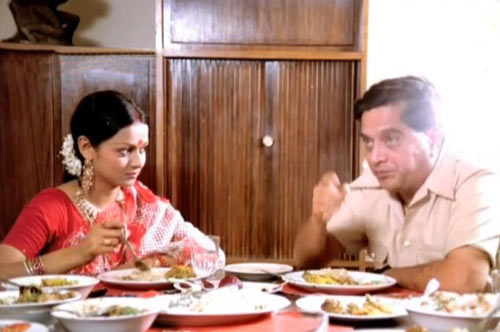
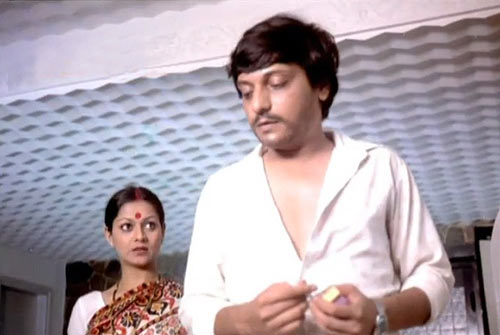
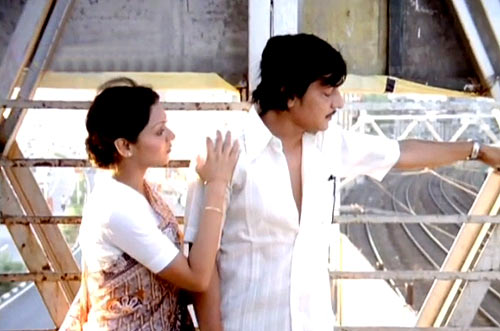
Comment
article